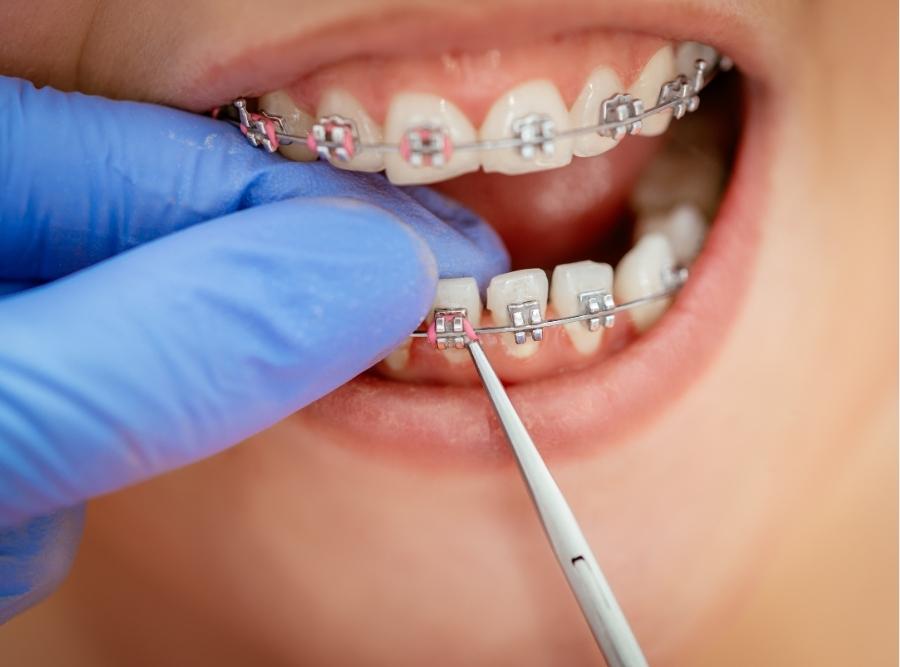Starting orthodontic treatment is an exciting step toward a straighter, healthier smile. At Miler Orthodontics, Dr. Miler and our team are here to walk you through every stage including the first week of having braces. Understanding what your mouth and lifestyle will go through during this initial period helps you adjust faster, feel more comfortable, and avoid unnecessary surprises.
The first week with braces is about adjustment, physical, emotional and everyday. You’ll experience new sensations, change some routines, and learn what your mouth needs so that your Lowcountry life—school, golf, beach days can continue with minimal interruption. Let’s go through what to expect, how to manage it, and when to reach out for help.
Initial Discomfort and How to Handle It
Once your braces are applied, the hardware itself doesn’t hurt but as the wires begin to shift your teeth, you’ll likely notice pressure and soreness. Many patients say it peaks around day two or three and gradually subsides.
To manage this, over-the-counter pain relievers can help especially if taken as instructed right before the pressure builds. Gentle, soft-chew meals and avoiding excessive biting ease the discomfort while your teeth adjust. If your cheeks or lips start to feel raw, a dab of orthodontic wax over sharp edges can make a big difference.
Keep in mind: feeling “looser” teeth is normal during this early stage. It’s part of the movement process—your teeth are shifting and your body is adapting.
Best Foods to Eat in Your First Few Days

Eating right during the first week helps minimize discomfort and protects your brackets and wires. Soft, easy-to-chew foods are ideal: think yogurt, smoothies, mashed potatoes, soups (not too hot), scrambled eggs and soft-cooked pasta.
Avoid crunchy, hard, sticky or chewy foods that can dislodge brackets or irritate tender teeth. Cut tougher items into smaller pieces and take your time chewing. Doing so not only lessens pain but reduces the chance of needing an unexpected visit.
In the Lowcountry, where outdoor dining, barbecues and seafood dinners are part of life, planning ahead helps, choose dishes that are braces-friendly or swap in softer sides for a few days until you adjust.
Getting Comfortable with Talking and Daily Activity
Having new hardware in your mouth can feel odd at first. You may notice slight changes in speech or feel your tongue navigating unfamiliar surfaces. That’s perfectly normal and usually fades in a few days.
Talking slowly, reading aloud, or simply practicing full speech at home helps your tongue learn the new space quickly. If you’re a professional in Bluffton who uses your voice daily—meetings, presentations or networking, spending a few minutes each evening practicing will ease the transition.
Continue your regular activities, stay hydrated, and use lip balm if your mouth feels dry from bracket contact. Your body will adapt faster with regular movement, clear focus on hygiene, and a relaxed mindset.
Managing Irritation: Orthodontic Wax and More
It’s common during the first week for brackets or wires to rub against the inside of your lips or cheeks. Left unchecked, this can lead to sore spots or ulcers. The good news: there’s an easy fix. Grab some orthodontic wax—pinch off a small piece, roll it into a ball, and press it over the irritated area. This provides a smooth barrier and allows your mouth to heal.
If persistent rubbing occurs in the same spot, use wax plus a warm salt-water rinse to soothe the area before bed. If after a few days discomfort remains or a bracket appears loose, contact our office. We’ll evaluate without delay.
When to Contact Your Orthodontist

While most first-week issues are mild and expected, knowing when to call is key. Reach out to us at Miler Orthodontics if you experience:
- Severe pain not relieved by over-the-counter medication
- A bracket or wire completely detaching
- A wire poking persistently and causing bleeding
- A retainer or appliance coming off unexpectedly
Prompt attention often prevents bigger problems or delay in your overall timeline. We’re here to help, your comfort and progress matter.
Pain Management Tips for the Week Ahead
Start with soft-chew meals and plenty of hydration—water helps clear debris and keeps your mouth healthy. Over-the-counter pain relievers (as directed) can soften the first 48 hours of soreness. Brushing gently with a soft-bristled toothbrush and rinsing after meals helps reduce irritation.
Warm salt-water rinses can calm sore spots and help your mouth adjust faster. Orthodontic wax should be kept handy throughout the day. Pack a small mirror, wax, and travel toothbrush & floss in your bag, just one more way to stay ahead of discomfort and feel confident going about your day in Bluffton.
Most importantly: remember that this period is temporary. Within a week you’ll likely feel much more comfortable and your routine will feel normal again.
Embracing the Beginning of Your Smile Journey
The first week with braces is all about adaptation. For families and individuals in the Lowcountry, staying informed and preparing in advance can turn what might seem like a challenge into a smooth, exciting start to your orthodontic journey. At Miler Orthodontics, our goal is to make your first week and every week that follows—comfortable, clear and aligned with your life. Let your smile take the lead.









